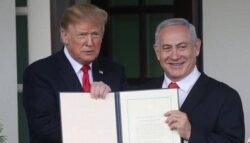Prime Minister Benjamin Netanyahu has won the Israeli national election, securing a record fifth term in office.
Netanyahu’s right-wing Likud won 37 of Knesset seats, against 36 for centrist Blue and White, headed by Netanyahu’s rival, former general Benny Gantz.
Though neither party captured a ruling majority in the 120-member Knesset, the results put Netanyahu in a strong position to form a coalition government with right-wing factions.
A remarkable achievement for a politician who was branded by critics as too inexperienced when he was narrowly elected for the first time in 1996.
As he nears the record-breaking marker though, Mr Netanyahu is fighting for his political survival in the face of a series of corruption allegations against him.
For years, Benjamin Netanyahu has portrayed himself as the person who can best keep Israel safe in the “tough neighbourhood” of the Middle East.
He has taken a hard line towards the Palestinians, putting Israel’s security concerns at the top of any discussion of peace.
Netanyahu highlighted his close relationship with US President Donald Trump, who delighted Israelis and angered Palestinians by recognising Jerusalem as Israel’s capital in 2017 and moving the American Embassy to the holy city last May.
He specifically focussed on how he held the president to account for promises made during his election campaign, and without that strength and determination shown by the PM, The US president may have not held up his end of the deal.
He then went on to boast the seizure of Golan Heights. Two weeks before the election, Trump signed a proclamation, with Netanyahu at his side at the White House, recognizing Israeli sovereignty over the occupied Golan Heights captured from Syria in the 1967 Middle East war.
He would wave his arms, and make passionate gestures of strength, like clenching his fists, during his campaign trail, whilst making suggestive remarks that he had ‘Trump under control’ and playing the puppet master to the US president.
In a rare turn during the race toward the Israeli-Palestinian conflict, Netanyahu further alarmed Palestinians by promising to annex Jewish settlements in the occupied West Bank if re-elected. Palestinians seek a state there and in the Gaza Strip, with East Jerusalem as its capital.
During the campaign, Gantz said a government under his stewardship would pursue peace, but stopped short of committing to the establishment of a Palestinian state.
A close result in the election would put smaller parties in a powerful position, turning marginal political figures into kingmakers, similar to the DUP’s strength in British politics.
Once the votes are tallied, President Reuven Rivlin will ask parties that have won parliamentary seats who they support for prime minister. He will then pick a party leader to try to form a coalition, giving the candidate 28 days to do so, with a two-week extension if needed.
One factor may be the turnout of voters from Israel’s 21 percent Arab minority. Many were angered by Israel’s nation-state law, passed in 2018, which declared that only Jews have the right of self-determination in the country. Legislation that the PM Netanyahu supported the legislation.
Netanyahu’s supporters in America have been praising his bond with Trump as a key component to dominating ‘peace talks’ in the Middle East, especially, with Saudi Arabia’s King Salman warming up to Israel, thanks to Trump.
………………………………………………………………..
[simple-payment id=”7912″]





